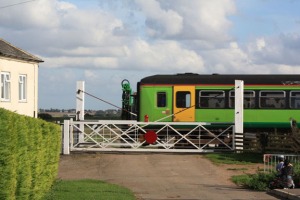Dr. David Keeling, head of WKU’s Department of Geography and Geology, recently returned from the third of four research trips to rural Lincolnshire in the United Kingdom, where he is investigating the impact of changing rail traffic on rural communities.

A typical rural gated rail crossing in Lincolnshire, with a tractor waiting for a passenger train to clear the area. (Photo by David Keeling)
His involvement in this project came about from a conversation with Dr. Bernie Strenecky, who serves as the Scholar in Residence at WKU through the Office of International Programs and the Honors College.
Dr. Strenecky hosted an exchange student from England in the early 1980s, Robbie Doughty, while teaching at the University of Louisville. Doughty is now the principle of Robert Doughty Consultancy in Lincolnshire and specializes in town and country planning and landscape architecture.
During a visit to the U.K. last summer, Dr. Keeling met with Doughty and the conversation turned to the challenges faced by Lincolnshire as a consequence of the national government’s plan to route more freight traffic along the rail line that runs through the mostly rural western part of the county. This conversation let to the outline of a research project to analysis the impacts on rural communities of increased rail freight traffic.
After conducting research on the line during fall break in October 2010, when he surveyed and mapped the entire length of the line, Dr. Keeling published an overview of the project in collaboration with Doughty in the international journal FOCUS on Geography titled Transportation Landscapes – Lincolnshire’s By-Pass Railway.
Earlier this year, Dr. Keeling found out that alumnus Evan O. Conder, who graduated from the Department in May 2010 with a B.S. in Geography – City and Regional Planning, had enrolled in the Master in Urban Planning (MUP) program at the University of Louisville. As part of his graduate program, Conder had signed up for a summer planning internship with Robert Doughty Consultancy in Lincolnshire.
During a third research visit to Lincolnshire in early August 2011, Dr. Keeling, Conder and Doughty met with planning and transportation officials in Lincoln, the county seat, and in Spalding, center of a large agriculture processing industry, to discuss the implications of the national government’s rail strategy for Lincolnshire.
These meetings, along with further rural analysis scheduled for October over fall break, will result in a journal article analyzing the economic and social implications for the communities through which the rail line runs, to be submitted to the international Journal of Transport Geography early in 2012.
Contact: David Keeling, (270) 745-4555.

